Digital Nomads in Uruguay: A Work and Travel Guide
Know the best cities to live in as a digital nomad in Uruguay. Information on visas, taxes, cost of living and more.
Are you planning to work remotely from Uruguay? At Holafly we want to provide you with an overview so you can be a digital nomad in Uruguay and make the most of your stay. The country of the orientals is growing as an emerging country for digital nomads, according to NomadList it’s ranked 94th and rising.
In the Digital Nomad Report, the main attributes valued by a digital nomad in Uruguay are climate, connectivity, low cost of living, an easy visa process and tourist attractions. From the best cities and types of visas to advice on accommodation and living costs, this comprehensive guide will help you find the best places to stay. This information will help you plan your stay successfully to make the most of your experience. Read on to find out how to be a digital nomad in Uruguay!
Why choose Uruguay to live as a digital nomad?
Uruguay’s gaining notoriety among digital nomads for several reasons, starting with its high quality of life. With a stable economy, access to world-class public services and infrastructure, this country offers an environment conducive to working from anywhere. Here are some of the main benefits Uruguay has to offer:
- Security and stability: Unlike many Latin American countries, Uruguay is known to be one of the safest and most politically stable countries in the region. This translates into peace of mind for foreign travellers and residents.
- High quality of life: Uruguay has one of the best quality of life in Latin America. With a well-developed infrastructure, access to quality medical services and an efficient transport network, the country has become a magnet for expatriates and digital nomads.
- Connectivity and access to internet: Montevideo, the capital, has excellent high-speed internet access , and other cities such as Punta del Este and Colonia are also well connected.
- Relaxed and friendly atmosphere: Uruguayans are known for their hospitality and the relaxed atmosphere that prevails in the country. This is ideal for those looking for a quiet and safe place to work while enjoying local life.
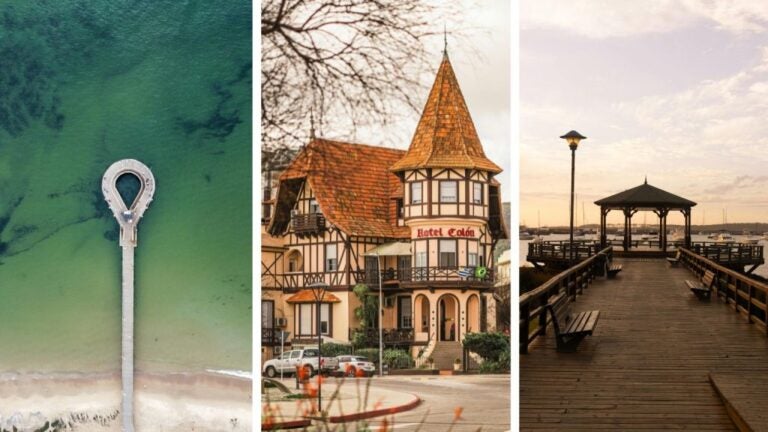
How to enter Uruguay as a digital nomad?
The Uruguayan government launched a residence permit for foreigners working remotely on a self-employed basis or for companies abroad. From 2022 you can access a specific visa for digital nomads called “temporary identity card – nomads” with a duration of 180 days with a possible extension for six more months. You can apply online before entering Uruguay or after entering as a regular tourist.
1. Requirements for temporary residence for 180 days
| Start the application by completing an online form with your personal details |
| Attach a signed affidavit affirming that you have the financial means to support yourself during your stay in the country |
2. Requirements to renew for an additional six months
| Valid Uruguayan identity card (the process is simple, takes 5 working days and costs $10 US) |
| Affidavit according to the reference format, the signature of the affidavit must match the signature on the identity card |
| Criminal Record Certificate duly legalised or apostilled and translated. A certificate issued by the Consulate of the country from which the background information is required, accredited by the Uruguayan Government, will also be valid. It shall be on the letterhead of the Consulate, shall be signed by the highest available authority, and shall state whether or not that person has no criminal record in that country |
| Vaccination certificate, certificate issued by a vaccination centre in Uruguay, certifying that the foreigner complies with the Uruguayan vaccination schedule |
You can find more information regarding the different options in this article about the visa for digital nomads in Uruguay.
3. Some nationalities require a special visa
Please note that depending on your nationality, you may require a visa to enter Uruguay. To check if you need to obtain a visa when entering Uruguay, the website of the National Directorate of Migration has an updated list of visa regimes by country.
4. What if I want to stay for more than 12 months?
If you want to stay longer than one year or work for a local company, you’ll need to apply for legal residence. This is a requirement for both work and unrestricted residence, so it’s a process you’ll need to complete if you intend to live in Uruguay.
Best destinations for digital Nomads in Uruguay
Uruguay is a very attractive destination for digital nomads because of the quality of life it offers in several of its major cities. Want to know which ones we recommend to establish yourself in the country? Let’s find out a little more about the lifestyle of each of them.
Top cities for digital nomads
1. Montevideo
The capital is the economic centre of Uruguay and is the largest city with one million inhabitants. Its most popular neighbourhoods for digital nomads include Pocitos and Ciudad Vieja, which have a variety of co-working spaces and quaint cafés to work in. Montevideo is also known for its long promenade, a seaside promenade perfect for relaxing after a day’s work.
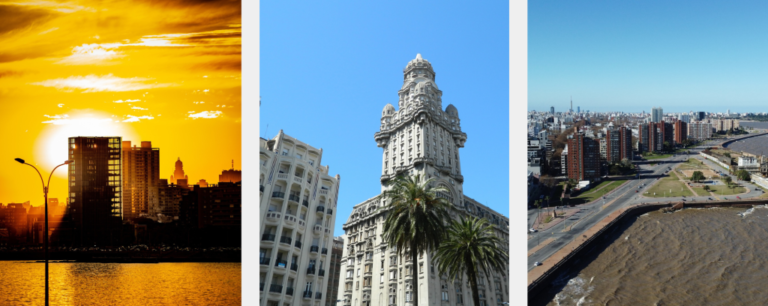
Montevideo, capital of Uruguay @pixabay
2. Punta del Este
This is the most luxurious destination in the region, with a focus on tourism, beaches and fine dining. This famous seaside resort attracts tourists from all over the world, but is also ideal for digital nomads outside the high season. It offers a quieter atmosphere, beaches and several co-working options that combine sea views with a professional environment.
It’s located an hour and a half from the capital, known for its expensive residences, tall waterfront buildings and a marina full of yachts. Punta del Este has a wide range of water activities, popular summer parties that attract celebrities and many digital nomads are attracted by its summer atmosphere and social nightlife. During the high season, the city fills up with events, the most frequent being cachengue and electrónica events where ticket prices range from $50 to $300 US.
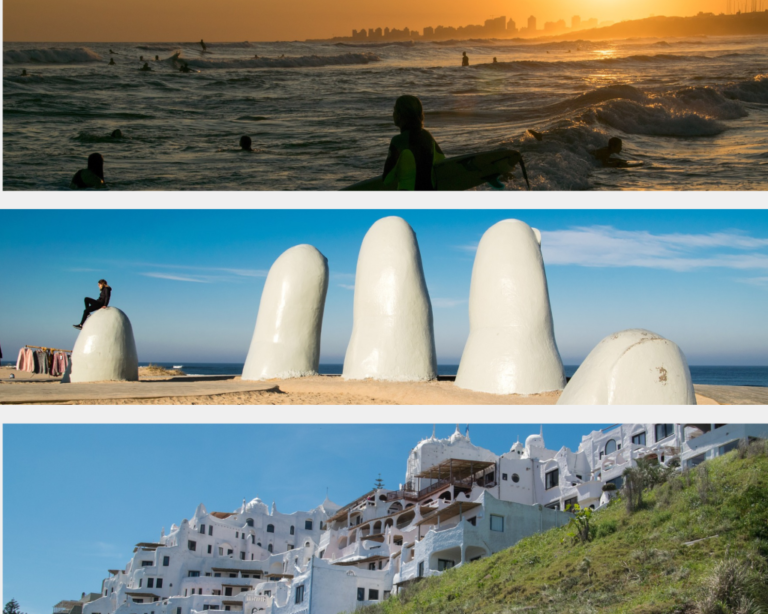
Punta del Este, the destination of choice for foreigners. @pixabay
3. Colonia del Sacramento
This city is known for its history and colonial charm, with a more tranquil setting. It’s an excellent choice for those who want to explore Uruguayan culture, enjoy the local wineries and get away from the crowds of the bigger cities.
Colonia del Sacramento, with its historic centre declared a World Heritage Site by UNESCO, has cobbled streets and an atmosphere that makes its sunsets unique.
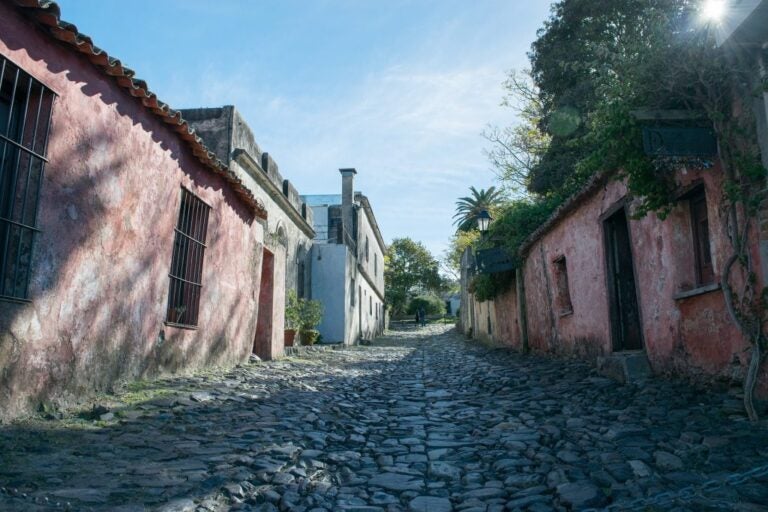
Colonia del Sacramento, one of the recommended destinations for digital nomads in Uruguay. @pixabay
4. La Paloma
It’s known as the national capital of surfing in Uruguay, ideal for lovers of waves and water activities. This relaxed, surfy environment attracts digital nomads looking to balance remote work with nature. During winter and early spring (July to October), it’s possible to see southern whales from the coast. Another fascinating phenomenon that occurs at certain times of the year is noctilucencies, a type of marine bioluminescence that illuminates the waves at night.
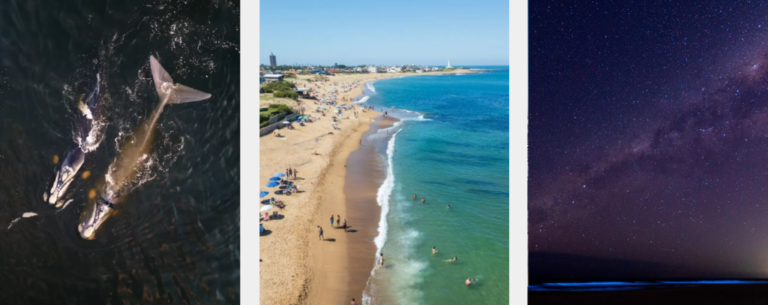
Attractions of La Paloma, Rocha @fotosdelapaloma
The digital nomad community in Uruguay is growing, leading in Montevideo, where it’s possible to find events and co-working spaces that facilitate integration. Social media and platforms like Bumble Friends are great for connecting with other people and making plans to get around the city. There are also foreigners’ social events on Wednesdays in Montevideo organised by @mis_uruguay.
Important: If you are a frequent traveler and want to stay connected without worrying about expensive roaming or looking for a new SIM at every destination, Holafly’s subscription plans are for you. With a single eSIM, enjoy internet in more than 170 countries for a fixed price and no surprises on your bill. Travel without limits and connect easily and securely! 🚀🌍

Transports in Uruguay
Transport and mobility in Uruguay is efficient and adaptable to different needs. If you plan to drive, you can use your foreign licence for a limited period, depending on the province you’re in. After that time, it’ll be necessary to validate it or apply for a new one through the local offices of the Dirección Nacional de Tránsito (National Transit Authority).
In terms of public transport, major cities such as Montevideo, Punta del Este and Colonia del Sacramento offer a comprehensive network of urban and suburban buses. Montevideo, in particular, has an efficient bus system, while in tourist cities such as Punta del Este, transport options are complemented by taxis and bicycle rental services. What’s more, taxi and ride sharing services such as Uber and Lyft are available in most urban areas, making it easier for digital nomads to get around.
Accommodation options for digital nomads in Uruguay
Uruguay offers various accommodation options for digital nomads, adapted to different budgets and lifestyles.
- Co-livings: These shared spaces are ideal for those seeking a community of remote professionals. Some options stand out, such as Sinergia Coliving in Montevideo and CoCasa in Punta del Este.
- Hotels: Many hotels offer long-stay rates with services such as high-speed internet. Options such as the Cottage Carrasco Hotel in Montevideo or the Barradas Parque Hotel & Spa in Punta del Este are popular among digital nomads for their flexibility.
- Flat rentals: In Montevideo, one-bedroom rents range from $500 to $800 US a month, while in Punta del Este and Colonia del Sacramento you can find options for $500 to $700 US, especially in the off-season.
- Short-term rentals and Airbnb: For more flexible stays, there are many temporary rental options available on platforms such as Airbnb in all major cities across the country.
Co-working spaces for digital nomads in Uruguay
In Montevideo and Punta del Este there are several co-working spaces, ideal for digital nomads. These spaces usually have everything you need to be able to work there for a few hours, making them a great way to stay productive while enjoying the country. We tell you some of the most outstanding:
- Montevideo
- The capital has an extensive network of co-working and co-living spaces.
- Sinergia Cowork: Is one of the most popular co-working spaces, with multiple locations in the city. It offers an active community and events for remote professionals.
- Co-Work Latam: Located in Pocitos, this space is modern and has all the facilities to work comfortably.
- Punta del Este
- Cowork Punta: Located in the iconic waterfront area, it’s perfect for those looking to work close to the beach. It offers a relaxed but productive environment.
- The Office Coworking: Another space in Punta del Este, popular with entrepreneurs and freelancers all year round, but especially outside the high season.
- Colonia del Sacramento:
- Colonia Cowork: Although the city is smaller, this space offers a welcoming and well-equipped working environment, located in the heart of the historic centre.
- La Paloma:
- Casa del mar: In this quiet seaside town, this space offers a relaxed yet functional option with Wi-fi for those looking to work near the beach.
Public spaces with good internet connection
If you’re planning your trip to Uruguay, either as a tourist or with the intention of establishing yourself as a digital nomad, we recommend that you consider connectivity options such as Holafly to stay connected. This way, you can enjoy a fast connection with unlimited data anywhere in the country. You can also connect to Wi-Fi in most public spaces:
- Public libraries: In cities such as Montevideo, Punta del Este and Colonia del Sacramento, public libraries offer free high-speed internet access and comfortable workspaces. A prominent example is the National Library in Montevideo.
- Coffee shops: Many coffee shops such as The Lab Coffee Roasters, La farmacia café, Culto café in Montevideo or Medialunas Calentitas, Vitaminas, A Brillar Café in Punta del Este are known for their cosy atmosphere and stable wifi connections, ideal for working.
Uruguay’s cuisine for digital nomads
Uruguay is famous for its high quality meat, and asado is the national food par excellence. For digital nomads, finding good places to eat won’t be a challenge, as major cities offer a wide variety of traditional restaurants as well as vegetarian and vegan options. If you prefer to cook at home, local markets such as the Mercado Modelo in Montevideo offer fresh produce such as fruit, vegetables and meat.
In terms of shopping, the main supermarket chains are Tata, Disco, Devoto and Tienda Inglesa, the latter popular with expats for its variety of imported goods. Cooking at home is a great way to save money, especially if you take advantage of local markets for fresh ingredients.
If you prefer to eat out, prices vary according to place. In a budget restaurant, a meal can cost between $300 and $600 UYU ($8 to 15 US), while in a mid-range restaurant, prices range from $800 to $1,500 UYU ($20 to $40 US). For digital nomads, a visit to Montevideo’s Mercado del Puerto is an excellent opportunity to try asado and other local specialities, such as chivito or empanadas.
Fast food and street food options are quite popular in the cities, offering dishes such as milanesa, empanadas and of course, mate, the traditional drink that Uruguayans enjoy at any time of the day.

Clothing in Uruguay
For digital nomads, it’s important to consider the climate and clothing options in Uruguay. The climate is temperate, but it can get quite cold in winter with temperatures below freezing. In terms of clothing, in major cities such as Montevideo and Punta del Este you’ll find international and local brand shops. Popular brands include Indian Emporium, H&M and Zara which offer clothes at moderate prices. In Punta del Este you can also find shops such as Valentino, Tommy Hilfiger, Calvin Klein among others. During the summer, white, light and comfortable clothes are the most used during the day while at night the temperature drops and it becomes warm so it’s recommended to have a coat at hand. In winter it’s recommended to wear warm clothes at all times.
Outdoor activities:
Uruguay offers a wide range of outdoor activities, perfect for digital nomads looking to enjoy nature. In the summer you can enjoy its beaches and practice water sports such as surfing, windsurfing, jet-skiing, jet-skiing, motor boating, sailing, fishing and yachting on its coasts. For those who love hiking, the Lunarejo Valley and the Sierras de Minas offer hiking trails to explore.
In addition, Cabo Polonio is a unique destination, known for its rustic atmosphere and its dunes. In Colonia del Sacramento, you can stroll through its historic streets and enjoy green areas, while in Las Termas del Daymán you can relax in its hot springs.
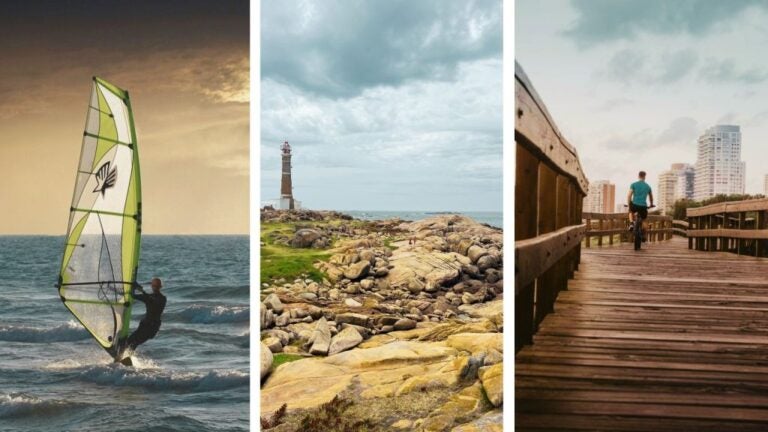
How does a digital nomad stay connected in Uruguay?
To stay connected, it’s essential to have a mobile data plan and to be able to work from anywhere in the country. This is where Holafly’s eSIM becomes a convenient option. The eSIM allows you to activate your data plan before you arrive in Uruguay, eliminating the need to search for a local SIM card when you arrive in the country. With Holafly, you can stay connected right from the start, which is crucial for digital nomads who need a stable connection to work.
Cost of living as a Digital Nomad in Uruguay
All in all, the total cost of living as a digital nomad in Uruguay can vary between $1,800 and $2500 US per month, depending on your lifestyle and the choices you make in terms of accommodation, food and leisure. This investment allows you to enjoy a relaxed environment, access to a good quality of life and a friendly atmosphere. Despite the costs, the unique cultural experiences and connectivity with other digital nomads make it worthwhile. Tailoring your budget and lifestyle can help you maximise your time in this country. Will Uruguay be your next home office?
Frequently Asked Questions about being a digital nomad in Uruguay
The best times are spring (September to November) and autumn (March to May), when the weather is milder and there are fewer tourists. Summer (December to February) is the ideal time to enjoy the resorts, but it can be more crowded.
Yes, especially in cities like Montevideo and Punta del Este, where there are communities of digital nomads and networking events that make it easy to meet other people with similar interests.
Digital nomads cannot work for Uruguayan companies without a Uruguayan identity card. However, working for foreign companies is completely legal.
The cost of living varies by city and lifestyle, but in general, Montevideo is cheaper than Punta del Este. It’s recommended to budget for accommodation, food and recreational activities. But we recommend at least $2,000 US per month.
To open a bank account in Uruguay, you’ll need to present identification documents, proof of address and in some cases, a bank reference. Some banks allow foreigners to open accounts without residency.





 Language
Language 


















 No results found
No results found


